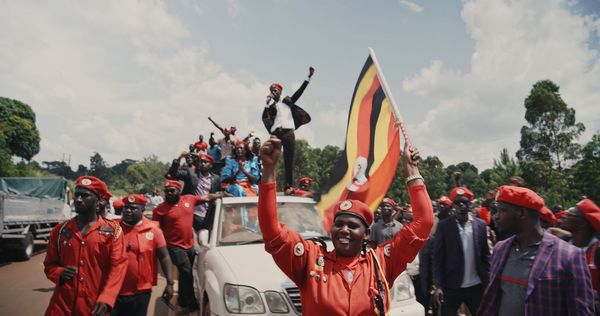Eye For Film >> Movies >> Bobi Wine: The People’s President (2022) Film Review
Bobi Wine: The People’s President
Reviewed by: Jennie Kermode

Usually when a political documentary gets Oscar attention it’s well after the fact, or else it’s sticking closely to an already popular line. This one addresses a situation which is present, volatile, and its inclusion on the Best Documentary shortlist for 2024 might itself be considered a political act. It’s exactly the sort of international attention that those in power in Uganda don’t want, and for those in opposition to them, always at risk of violence or arrest, it offers a lifeline.
The film is comprised primarily of footage shot by journalists in almost constant contact with their subject, Robert Kyagulanyi Ssentamu, aka the musician and actor Bobi Wine. It follows the events ensuing from his decision, in 2017, to run for the Ugandan presidency. For context, the incumbent, Yoweri Museveni, came to power in 1986 in the aftermath of the country’s Bush War. He was seen, then, as a candidate for change, having played a key role in the overthrow of the brutal Obote regime. The usual promises about democracy and human rights followed, but over time, as is so often the case, progress tailed off. He twice changed the constitution so that he could run again, and even as early as his second election, credible reports were circulating about voter intimidation and corruption.

Taking on a man like that is no small thing. There have been multiple accusations surrounding the most recent election, and a remarkable amount is captured directly in this film, from clear interference with the electoral process to straight-out acts of aggression and intimidation. This is supplemented with footage from news archives in order to present a more complete picture of key events, such as the attempt on Wine’s life which saw him hospitalised for a significant period and ultimately led to him sending his children abroad for their safety.
This kind of filmmaking is always difficult, and not just because of the physical risks it involves. It’s difficult to experience such things, and to be so close to a political campaign, without losing the impartiality essential to telling the story well. Wisely, directors Moses Bwayo and Christopher Sharp make no effort to position themselves as separate or aloof – there are times when we can see well enough from the camera movement that they are caught up in events and reacting instinctively – but, rather, build up a collection of footage which speaks for itself. This includes an interview with Museveni, whose efforts to sell himself as an honest, decent man are counterproductive to the point than one imagines his promotional team must have been in tears.
Wine, by contrast, comes across very well in interviews. Is this all about character, or does it also reflect the 38 year difference in their ages? Museveni’s slick, constantly smiling approach may send the wrong signals today but was better suited to the media style of the Eighties. His opponent understands the modern media machine very well, and recognises the expectations created by social media: people now feel that they should have the opportunity to connect with public figures directly. As he sets out to visit every province of the country, the other side, unable to compete, seems focused on sabotage.
Though we spend a good part of the film inside offices or private homes, there is also a lot of footage from the streets, where passions run high. This isn’t simply a case of people engaged in protest. Uganda’s democracy is young enough that people still celebrate it in a way that is rare in Europe or the US, and audiences may well find something salutary in the sight of people running and cheering with delight as they hear the values they support espoused. Despite the challenges which the country continues to face, there is an intense belief in the possibilities that the future offers. This gives the film an electric energy.
Those unfamiliar with the political situation in Uganda will find themselves thrown in at the deep end. There is no effort here to provide an easy introduction, but it is easy to get to connect with the story as it develops, and there is little danger of viewers feeling disengaged. For people who never paid much attention to any political process outside their home nations, this is a great place to start.
Reviewed on: 26 Dec 2023















